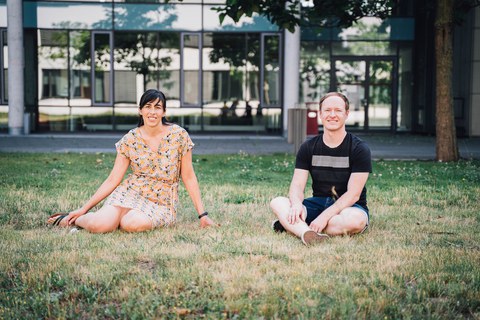Aug 11, 2020
The CRTD Postdoc Award 2020 goes to Dr. Julieta Aprea and Dr. Kenneth Peuker! Congratulations!

Dr. Julieta Aprea (left) and Dr. Kenneth Peuker (right)
This year featured the first edition of CRTD Postdoc Award - the prize recognizing the excellent scientific achievements at CRTD. The award committee evaluated a number of impressive applications and after a long deliberation selected not one, but two awardees!
Dr. Julieta Aprea is part of Prof. Dr. Federico Calegari’s research group. “I study brain development and I am currently working on two different lines of research. One focuses on the role of long non-coding RNA (lncRNA) in the development of the brain, particularly the cerebral cortex. More specifically, I am looking at what role a novel lncRNA plays in the expansion of different populations of stem cells and progenitor cells - cells that have more limited potency and self-renewal capacities than stem cells. Through the other research line, I have identified novel discrete progenitor domains in the developing cerebral cortex. These domains have sharply defined boundaries and are characterized by the expression of a specific transcriptional cofactor, which might be important for arealization - the process in which the cortex subdivides into areas with a defined function,” explains Dr. Aprea.
Dr. Kenneth Peuker works in the research group of Prof. Dr. Sebastian Zeissig. “My postdoctoral work focuses on the mechanisms involved in the regulation of the cells lining up the intestine - the intestinal epithelium. I am analyzing this intestinal compartment under healthy and pathological conditions, as many diseases such as inflammatory bowel disease and cancer dysregulate the intestinal epithelium. Through my work, I characterized novel pathways that are critical for the control of epithelial regeneration. I also showed how changes in epithelial regeneration could lead to diseases. Moreover, my research revealed pathways amenable to therapeutic targeting. Therefore, my work could provide a basis for future therapeutic strategies, e.g., promoting epithelial regeneration in case of defects in wound healing, which is common for inflammatory bowel disease, or interfering with the uncontrolled regeneration, which happens in intestinal tumors,” says Dr. Peuker.
Our big congratulations go to both researchers, who will receive a budget of 10,000 euro to advance their own projects and to boost their scientific careers.
